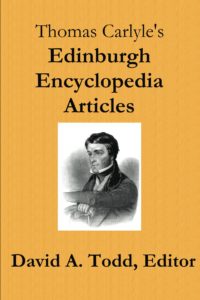
It’s been a while since I’ve written anything for An Arrow Through The Air about Thomas Carlyle and my studies about his life and writing career. I’ve published one book about him, a compilation of the articles he wrote in the early 1820s for The Edinburgh Encyclopedia. I’ve sold a whopping nine copies of it.
How to explain my fascination with Carlyle? He is a most complex character. Raised in southeast Scotland by strict religious parents who we’d consider to be peasants, he studied for the ministry, then briefly for the law, before settling on literature as a way to earn his bread. The encyclopedia articles were his writing apprenticeship of sorts. From there he did mostly translations for a while, with commentary sprinkled amidst the words of others. Thence it was magazine articles for most of the next six years, though with some book writing.
Finally, he broke out into books, and obtained success. He was significantly helped by Ralph Waldo Emerson, who published his books in the USA and sent handsome royalty checks back across the pond. England noticed his success in America, and began to demand his books. By 1840 he had achieved a measure of financial success.
The biggest disappointment for those who like Carlyle has to be his embrace of race-based slavery. He was quite upset that Great Britain was in the period of emancipation of all slaves in the empire. It was passed by Parliament in 1833 and would become final in 1848. By 1849 Carlyle was writing and publishing pamphlets in support of slavery.
How awful that is. How could he do that? His belief that work was the highest and best thing mankind could do, and that since slavery was guaranteed work it was good, caused him to be blinded by such concepts as freedom and justice. My question is: How did this happen? And when? My Carlyle studies are for the purpose of answering this question. What caused him to land on the dark side of this issue in history?
I have two more Carlyle books in the works:
- Thomas Carlyle: A Chronological Composition Bibliography
- Carlyle’s Chartism Through the Ages
Both of these are on the shelf for now. The second one is perhaps 70 percent complete, though I don’t know that for sure. My two essays to close the book are yet to be written. And I have to check with several Carlyle authors to gain permission to reprint essays of theirs. The first one is less far along, maybe 50 percent. Yet, this one I continue to plod along on, that plodding purposefully quite slow.
I have the format of the Bibliography established, and am reasonably satisfied that I have all, or darn near all, of his known compositions for the years up to 1842/3 entered and documented as to composition dates. I have a few things to make more sure of, such as how to handle the notebooks he used in 1822 to about 1833, but I’m fairly happy with how that part is shaping up. So I still need to add his later works, from 1843 through his death in 1881.
The good news is this is the period of his life when his writings were mostly all published, and the dates of composition are fairly well known. I got past the hard part, the years before 1834. But, that doesn’t mean everything falls into place without research. Publication dates are known and documented; composition dates still need to be established for some items. To do this, I’m working my way through Carlyle’s letters, wherein he often mentions what his work(s)-in-progress is/are.
Right now I’m reading one letter a day, from the Carlyle Letters Online, a database of Duke University. Or, if in a given day he includes a short note, I might read a couple or three letters. I do this in my quiet time when I arrive early at my office, after my devotions, and before I work up the day’s to-do list. So I read maybe 10 to 15 letters a week, taking 5 to 10 minutes of my time every workday. I’m currently in July 1843. Carlyle had just finished a magazine article and went on a holiday (without Jane, his wife, who it appears didn’t want to go) to Wales and Scotland.
The days I’m reading now, he is between compositions. I could skip them, but have elected not to. I feel they give insight into the man, and could be useful for all of my Carlyle writings, either those in progress or something in the future that I don’t yet foresee.
This is, for the most part, satisfying the need I have to be working on something that would be considered intellectual rather than simple entertainment, or even popular education. I don’t say that to be snobbish. I just want to work on things that really expand my mind. I have more to say about that, but this post is already long. I’ll save that for a future post, perhaps my next one.